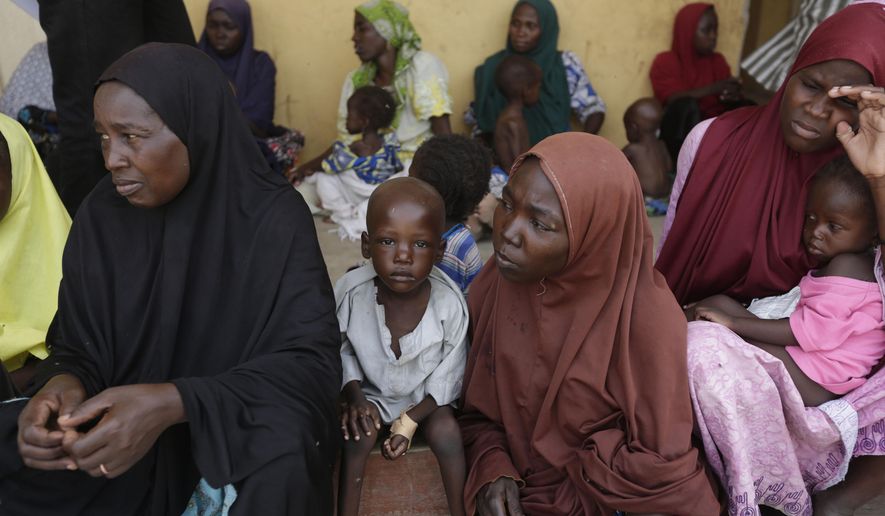Defeating the murderous jihadi Boko Haram movement will require a multipronged approach beyond defeating the Islamist forces on the battlefield, a key political figure from one of the African countries trying to defeat the insurgency told a Washington audience Wednesday.
Based in northern Nigeria, Boko Haram forces have launched terror attacks on many of Nigeria’s neighbors, while recently expressing its loyalty to the Islamic State movement. A new multinational force of 8,700 troops from Nigeria, Niger, Chad, Cameroon and Benin to combat the insurgency in the Lake Chad region is being organized in the coming weeks.
But a long-term strategy for defeating Boko Haram will have to address the economic and social needs of the region, said Kah Walla, head of the Cameroon People’s Party and a former presidential candidate in the nation that shares a long border with Nigeria.
“You can use guns to stop the killings, and we probably need that, but if you do not address the root causes of this problem, you will just be pushing the problem forward six months, one year or two years, but it will come back,” Ms. Walla said at a briefing at the Woodrow Wilson Center.
As Boko Haram extends beyond Nigeria’s borders into Chad, Cameroon and Niger, world leaders are scrambling for ways to contain and defeat the insurgency. Recently elected Nigerian President Muhammadu Buhari has vowed to defeat the group, but his reliance on military force as a solution has some regional and international partners worried that the regime isn’t targeting the underlying problems.
“Boko Haram has taken root in the areas where people are extremely poor, feel very marginalized, feel like they don’t have any kind of voice and where governance has been extremely poor,” Ms. Walla said. “We must all acknowledge that the Boko Haram rhetoric has a certain level of attraction.”
SEE ALSO: Iran could enjoy sanctions relief before year’s end: report
In remote regions of Nigeria and Cameroon, the central governments have been unable to deliver basic services, including water, electricity, schools and health care, to about 70 to 80 percent of the people, Ms. Walla said. Many young people, who feel economically marginalized, see Boko Haram as a savior.
Just this week, Boko Haram killed at least 40 people in northeastern Nigeria on Monday and Tuesday. The attack, the latest in a spate of killings that have left more than 250 people dead over the last three weeks, comes as analysts and politicians raise doubts over the region’s approach in defeating the radical group.
Since 2009, Boko Haram has killed an estimated 12,000 to 15,000 people while internally displacing 1.5 million people, Ms. Walla said. The group controls roughly 29,000 square miles of territory. It is reported that Boko Haram — which is loosely translated in English as “Western Education is Sinful” — routinely beheads civilians in mosques, pillages villages, holds hostages for ransom and uses girls as young as seven years old to carry out suicide attacks.
Governments in the region, marred by mass political corruption, miscommunication and financial limitations, are beginning to address the rise of the radical militants as a regional emergency.
Government officials from Niger, Chad, Benin and Cameroon met Mr. Buhari in Nigeria’s capital on June 11 to discuss the region’s approach to defeating the insurgency. This came just days after Mr. Buhari urged world leaders at the G-7 summit in Germany for more help in the fight, although he maintains that Nigeria has to be held ultimately responsible.
“The answer to defeating Boko Haram begins and ends with Nigeria,” Mr. Buhari wrote in an op-ed in The New York Times in April.
SEE ALSO: U.S. citizens warned to stay alert in El Salvador amid violence
The U.S. government has supported Nigeria’s efforts to eradicate the terror group by sending military advisers to the region, training local police and providing financial aid, but experts say America’s role won’t extend much further.
“You can buy [the Nigerian military] trucks,” said Lauren Blanchard, a specialist in African Affairs with the Congressional Research Service, “but you can’t force them to fuel the vehicles.”
• Brennan Weiss can be reached at bweiss@washingtontimes.com.




Please read our comment policy before commenting.